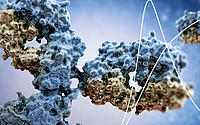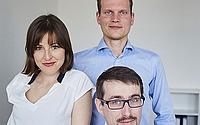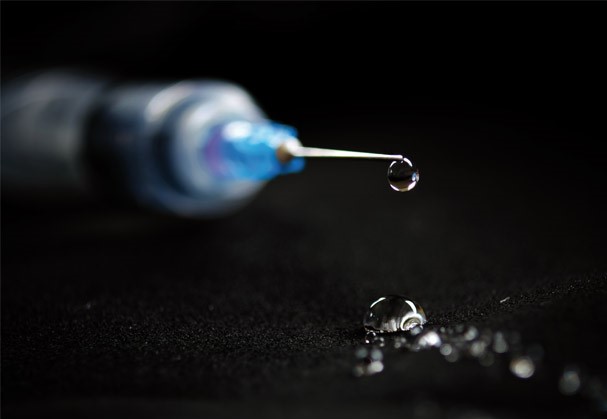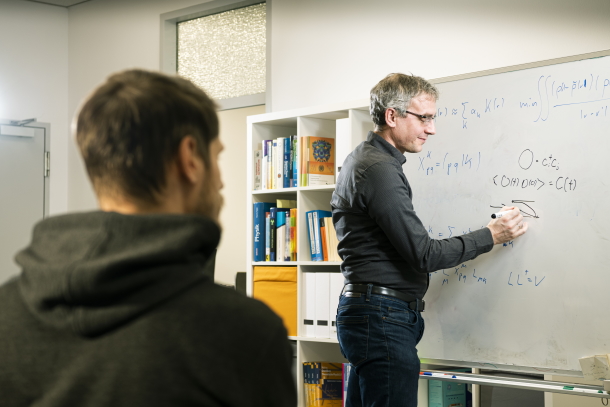How GoSilico aims to revolutionize the biopharma industry with simulation software.
"What drives us," says mathematician Teresa Baumann, Ph.D., "is the mission to bring biopharmaceutical active ingredients to market faster and cheaper." Together with Tobias Hahn, Ph.D., Thiemo Huuk, Ph.D. and Prof. Juergen Hubbuch, she founded GoSilico GmbH, a spin-off of KIT, in 2016. True to their advertising slogan "Stop Experimenting. Go Silico.", the four entrepreneurs have made it their goal to accompany biopharma companies in the upcoming paradigm shift from experimental to computer-aided process development.
The path to approval of a biopharmaceutical active ingredient against complex diseases such as cancer, Alzheimer's or diabetes requires a great deal of stamina. On average, development takes ten years, involving countless experiments and costs running into billions. The reason for this is the high demands placed on drugs, which in addition to tolerability and efficacy also concern the robustness of the manufacturing process and the purity of the active ingredients.
GoSilico has found a solution to save much of the laboratory experimentation previously required to develop the manufacturing process. The company's core product is ChromX software, which allows chromatographic experiments to be simulated in seconds on a computer – in silico.
The software is used to develop purification processes for the respective active ingredients. In the production of biopharmaceuticals, genetically modified cells, such as yeast or E. coli bacteria, are cultivated to produce the desired protein, such as antibodies. However, these cells contain not only the pure active ingredient, but also foreign proteins or viruses that have to be filtered out. Process development currently requires hundreds of chromatographic laboratory experiments, which involve a great deal of manual effort not only in execution, but also in preparation and post-processing. "You have to allow an average of two to three days for a classic experiment," says Thiemo Huuk.
With ChromX, the founders are making a considerable contribution to the digital transformation of the industry. For some time now, digital lab diaries or Big Data approaches have been simplifying processes in the biopharmaceutical industry. GoSilico is now going even further. Huuk explains: "We're not just delivering a digital solution, but a smart model with comparatively little data that can be analyzed with just a few clicks."
Hahn and Huuk came up with the idea for the software in the course of their doctoral studies at the Institute of Bio- and Food Technology (BLT) under Professor Hubbuch at KIT. They addressed the question of whether it would be possible to validate the hypotheses of chromatographic experiments by simulation. When the two presented their results at various congresses and were met with great interest from industry, they considered the option of founding a company for the first time. From then on, things went one step at a time. In 2015, the application for federal funding under the EXIST-Gruenderstipendium was approved. Teresa Baumann joined as another founding member and the team moved into a new office space in the CyberLab of CyberForum e.V. and acquired their first pilot customers. Hubbuch has since increasingly withdrawn from day-to-day business and now continues to support the team as a consultant on strategic issues. The founders have already won several prestigious awards with their business idea. For example, in 2016 they achieved first place in the Elevator Pitch Baden-Wuerttemberg (watch the included video), received the CyberChampions Award in the Best Startup category in 2017 and won the concept phase of the Science4Life competition in the same year.
Today, the team already has nine customers from the biopharma industry testing the software. In addition, GoSilico offers training to make it easier for companies to work with the software. Baumann is optimistic about the future: "Our product can of course be used in other areas involving the production of high-purity substances: rare earths, fine chemicals or food additives. First, however, we want to establish our software as the standard for regulatory approval of purification processes. For approval before the FDA or EMA, pharmaceutical companies must prove that their processes are stable and robust. For some years now, the authorities have been suggesting that this proof should be supported by simulation. So far, however, there is no precedent for this. We are making sure that we will achieve this as soon as possible.”
"To drive innovation in biopharmaceuticals, you have to be patient above all. The belief in our product and the positive encouragement from our customers spur us on tremendously."
IT AND BIOPHARMAINDUSTRY HAND IN HAND
As part of a PERMIDES-funded project, GoSilico is supporting Cevec Pharmaceuticals GmbH in the development of individual purification processes for virus-like particles using computer simulation. So far, ChromX has only been used for the purification of antibodies, recombinant proteins, nucleic acids and insulin, but by extending this to virus-like agents, personalized vaccines against cancer can also be brought to market faster and at lower cost in the future. PERMIDES is part of the European Union's framework program for research and innovation, called Horizon 2020, and aims to promote innovation in the biopharma industry through collaborations with IT companies.
Image: KIT






